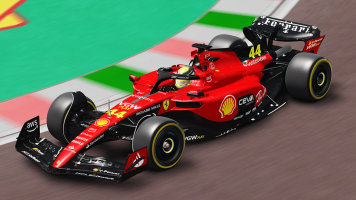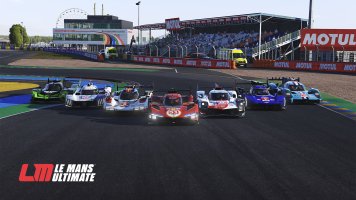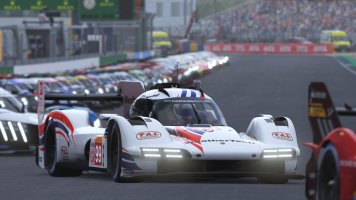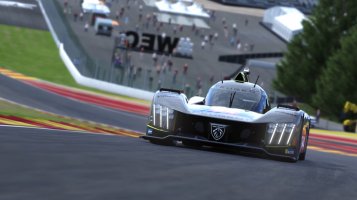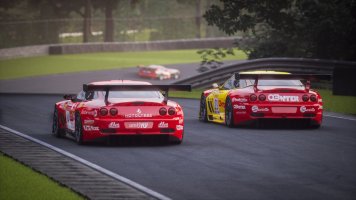Welcome to the new season, same as the old season.
Just in case pre-season testing left any doubt at all, the 2015 Australian Grand Prix absolutely obliterated it – Mercedes AMG Petronas are in a class of their own.
With a 1.4 second gap to third in qualifying, and a 37-second margin in the race, the Silver Arrows of winner Lewis Hamilton and teammate Nico Rosberg aren’t really competing in Formula 1, inasmuch as they’re racing each other in Formula 1a. We had a feeling all along this might be the case, but to see it play out is no less staggering. Other teams simply can’t hope to race them – realistically, the only way Mercedes might be forced to fight for their victories is if they’re required to do a doughnut on the pit-straight with five laps to go.
And yet, while this is certainly not the 2015 season most people wanted, Sunday’s race demonstrated that such dominance doesn’t have to come without intrigue, so let’s take a look at some of the big talking points from the Australian Grand Prix.
Back in November 2013, Red Bull Racing were – for the fourth year running – on top of the F1 world. Possessing a knack for innovation unmatched by their rivals, they had taken 13 of the season’s 19 race victories, and 41 of the 77 over that whole span. Their engine partnership with Renault was as strong as ever, usurping the ‘works team’ title that had previously belonged to Lotus/Renault GP. New engine regulations or not, it seemed like the immediate future belonged to them.
Oh, how the mighty have fallen.
Looking at the team of 2010-13, the RBR of March 2015 is an impostor by comparison. A cheap knock-off of a superior product, one that looks similar and does many of the same things, but not as well, and for nowhere near as long.
Case-in-point was Melbourne. With only four engines allowed (before penalties) for the 2015 season, both of their drivers were down to three by the end of the weekend – Daniel Ricciardo blowing one in free practice, Dany Kvyat doing likewise en route to the starting grid. A car down, the race did nothing to raise the team’s spirits, as Ricciardo couldn’t find his way past a Sauber and finished sixth.
So when team advisor Helmut Marko suggested owner Dietrich Mateschitz could “lose his passion for F1”, and principal Christian Horner called for an “equalisation mechanism” in order to help catch-up to Mercedes, we were getting a glimpse into the mindset of a team who has failed to realise just how precipitous the drop from F1 dominance can be.
Regardless of the credibility of their argument, the five-year arc they have created this decade is going to work against them in the eyes of many, but do they actually have a point? Well, yes and no.
Certainly, having one team sprint off into the distance every race bodes poorly for the quality of ‘the show’, but it doesn’t always lead to boring races, and as Red Bull well knows – it’s not without precedent. And while restoring competitiveness across teams is desirable for everyone, what Horner suggests would likely drive up the costs which already threaten the survival of multiple teams on the grid.
However, there is one question whose answer I think could assist in short-term competitiveness, and should be asked particularly in the wake of Sunday’s race: why are Williams (and to a lesser extent Lotus and Force India) so far off the pace, when they’re supposedly using the same engine? Felipe Massa jokingly mentioned this in Saturday’s press conference, but there is real cause for concern. Differences in budget would be an important factor to be sure, but shouldn’t the FIA be looking into the transparency of Mercedes’ engine development when one user is 1.4 seconds ahead of the other? That’s a shocking difference for teams supposedly playing in the same ballpark.
Maybe this is the F1 we’re stuck with for 2015. We won’t know for sure until Barcelona when the first round of major updates are introduced, but great races only require a duel for the lead to be memorable (e.g. Bahrain 2014), so there is hope yet for the quality to increase. Long-term the answer is much simpler – adopt the regulatory practice of the World Endurance Championship, and allow manufacturers to develop engines to their own specifications, within a few general parameters. Give engine suppliers room to operate with their specific know-how, and not only will we see a competitive grid, but a more varied list of names behind it.
Perhaps the most notable moment of the weekend was the two German drivers’ exchange in Sunday’s press conference. Their good-natured barbs provided the assembled media (which included us!) with more action than had occurred throughout the entirety of the race, and maybe an indicator as to the two personalities who will drive the 2015 season.
Between the Mercedes drivers, Rosberg is the far more interesting character as we start 2015. Besides being the driver far likelier to provide an interesting soundbyte, he finds himself in a position which is quite rare for a driver of his talent – that is, he may have simply met his superior.
While F1 has had plenty of no. 1-2 driver battles over the years, it’s usually apparent quite early-on who is the better of the two, or, they don’t last long enough together to give us a conclusive answer – yet Rosberg will get one, as after fighting Hamilton to a standstill in 2013 and losing quite convincingly in 2014, he gets one more chance to change minds in this third season together. As such he returns with everything to prove, and the only hope of making Mercedes’ dominance interesting. The early returns in Melbourne were mixed, topping the timesheets in practice but faltering in qualifying – the pace is clearly there to take it to the Brit, and for the sport’s sake, he has to.
On the other hand, Vettel’s position doesn’t require the same sense of immediacy of Rosberg’s. It’s not about winning for the four-time champion, it’s about us learning who he is outside the cocoon of the Red Bull team he called home for seven seasons. As his quotes last weekend demonstrated, he has the chance to establish himself as a sort of senior figure in the sport, a more likeable one than the guy who irked fans with his celebrations and teammate squabbles. For Vettel 2015 is an opportunity to change perceptions of him away from the track, perhaps even more than he can on it.
Should we be worried about 11 cars finishing the race?
Attrition has historically, always been a part of F1. The sight of cars breaking down on the track is as old as Bernie Ecclestone (well, nothing’s that old). Nevertheless, it’s a bit concerning to see in 2015, when reliability is supposed to have progressed to all-time highs. After all, these aren’t the ‘garagistas’ of the 1970s, these a multi-million dollar companies building these machines.
Still, it’s far too early to say whether the results of Sunday marks a trend for 2015, and dissecting the reasons why, there’s no cause for excessive concern. In fact, the reality that these are multi-million dollar companies probably has something to do with it, as they push themselves to match and better their rivals. Just compare McLaren-Honda to Ferrari – the former have been struggling for reliability throughout the preseason, but that is clearly with the intent of making up for the year-less in development they’ve got to everyone else, while the latter know exactly where they are in relation to the grid, and want to ensure some good results before Barcelona. Manor was never expected to be in the paddock, let alone racing a few weeks ago; Bottas’ injury was simply unfortunate; Lotus are using Mercedes power, so they’ll be fine; Red Bull/Toro Rosso are the only real concern, but that’s far too tight a partnership to not see some progress in improving reliability, if not pace. So no, we shouldn’t. What we should be concerned about isn’t when 14 cars make the grid, but when 14 cars is all that we can hope to see in the first place.
Do Red Bull have a leg to stand on? What can we expect from the Germans in 2015? Should we be concerned about an 11-car finish? Sound off in the comments below.
Last edited:




